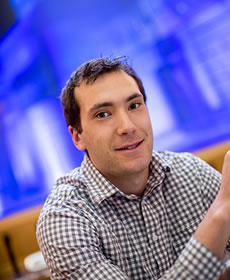
Master’s Student Brings Personal Experience to Autism Work
Though he didn’t know it at the time, Eric Rubenstein began his fieldwork in autism as a 10-year-old fifth-grader, helping out at his school in pre-kindergarten for special needs children.
Now 24, Rubenstein has never stopped working with developmentally disabled children—mainly those with autism spectrum disorders (ASD). He’s been a buddy in a recreational baseball league, a camp counselor and, in college, was a teacher at a special-needs school.
When he enrolled in the Bloomberg School’s Master of Science program in Epidemiology, he brought a unique and invaluable understanding of children with ASD—the focus of his studies and future career in autism research.
“There’s such a wide range of topics that need exploration,” says Rubenstein. “It’s exciting as a researcher . . . to try to and look for answers for this population.”
Rubenstein has received two research grants through the Wendy Klag Scholar Program—awarded by the School’s Wendy Klag Center for Autism and Developmental Disabilities. The funding allowed him to present his research on endophenotypic sex differences in autism spectrum disorders at a conference, and to lead a project to improve data-collection methods of local developmental disabilities organizations.
Even with the demands of his academic program, Rubenstein made time to volunteer with Maryland’s Special Olympics Program, this year coaching his basketball team to gold.
As he prepares to begin working toward a PhD in epidemiology at the University of North Carolina, Chapel Hill, in the fall, Rubenstein says the Bloomberg School has served him well.
“Being at the best school of public health with the best researchers, you really have access to resources here that you can’t get anywhere else,” he says.
Department of Epidemiology
Wendy Klag Scholar Funding